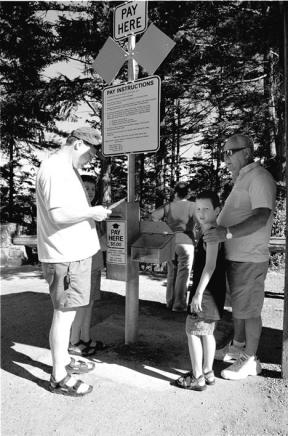A new presence is making itself known in state parks throughout Washington. The parking lot pay station is still in its debut season, and critics and the public are still determining their judgments and sentiments.
Locals and visitors alike say they have mixed feelings on the implementation of a $5 daily parking fee. Prior to this summer, parking at state parks was free. Now, any visitor who parks in a park must pay the fee at pay stations similar to those used in commercial parking lots.
Common responses are apathy toward the fee itself or toward what it pays for, ignorance of the fee, a sense of injustice at having to pay, or simple submission in paying the fee for the greater good.
Eugene Thrasher, a Langley resident who made a recent trip to Whidbey Island’s best-known state park, Deception Pass, said he was glad to pay the fee. He does not understand why some people try anything they can think of to get out of paying the parking fee.
“People still don’t respect the facilities,” Thrasher said. “But you pay everywhere else you go.”
Don Jones of Stanwood, who was on a camping trip at Deception Pass last week, said he disagrees with the new parking fee.
“I don’t think it’s necessary,” he said. “the state government already has too much overhead, and then they threaten the public with closing the parks.”
Jones said he believes many families cannot afford to pay a fee every time they want to go to the beach or watch a sunset. He said when the state implemented the fee in January, he and his family ceased spending Sunday afternoons in the park.
No matter how the public feels about the parking fee, officials with the state parks system say they need the income. Virginia Painter, public affairs administrator for the Washington State Parks and Recreation Commission, said that for the past 10 years park budgets have had to stretch further and become more restricted.
She said state park use has risen in the last decade, and with less money and increased use, the rate of park deterioration has far exceeded that of park improvements.
With the imminent possibility of having to close several parks because of lack of maintenance or environmental damage, the Parks and Recreation Commission implemented the vehicle parking fee in all state parks in January.
Presently, the daily charge for a parking pass is $5 per car. The commission had originally set the fee at $7, but decided to give the public a few years to get used to the idea. The fee will stay at $5 through 2005, then will increase to $7 in 2006.
Painter said that until this year day users of state parks haven’t had to pay a user fee. But, she said, however, day users make up about 94 percent of park visitors.
“We have to collect the fee. It is part of what we will depend on to function,” Painter said. “The only responsible thing to do is to ask the majority of people who use the parks to help pay for them.”
Painter said the parking fee money will be spent on park improvements.
Bill Overby, manager at Deception Pass State Park, said he understands why the commission decided to implement the parking fee. He said the deterioration of park facilities and rising maintenance costs left little choice.
Overby said many people understand the reason for the fee and are willing to pay. At the same time, he said there are some who are not used to paying the fee or are unaware that it’s required.
He said roving park rangers patrol the parking lots, but they are not meter maids. When a park visitor gets a parking fee notice, he or she does need to pay the parking fee. Failure to do so could draw a $118 fine.
At the moment, rangers enforcing the fee are expected to assume a visitor who fails to pay the fee does so out of ignorance. Overby said he expects most people will pay after receiving a fee notice.
Fortunately for Whidbey Island parks, the fee is not putting a dent into visitor traffic, Brett Bayne, a ranger at Fort Casey State Park near Coupeville, said even with the new fee, park attendance has increased this year.
Fort Casey rangers are trying to be as kind and gentle as possible in enforcing the parking fee. They give drivers a 10 minute grace period, during which people can get out of their car to stretch, take a few pictures or use the restroom.
Not everyone who uses the park has to pay a fee. Bicyclists can park their two-wheeled vehicles free.
Parks Commission spokeswoman Painter said that agency is trying to create a system that would allow low-income families, war veterans and disabled people to apply for free park passes.
Those who visit state parks frequently might save money by buying an annual parking pass for $50, which is good in all Washington state parks.



